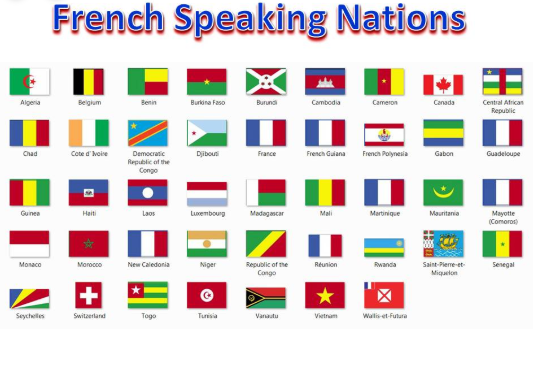Learn French Online
And at our Centers in Mulund and Airoli
French is an official language in 29 countries across multiple different continents
It is spoken as a first language (in descending order of the number of speakers) in France, many Canadian provinces, Francophone regions, parts of Belgium, Switzerland, USA & northwestern Italy.
French is estimated to have about 76 million native speakers and about 235 million daily, fluent speakers.
As an international language of business, scientific research, publishing and tourism, it’s estimated that French is spoken as a foreign language by an additional 110 million people worldwide.





WHY LEARN FRENCH?
French is the Official Language in More than 29+ Countries
“The only French word I know is oui, which means “yes,” and only recently did I learn it’s spelled o-u-i and not w-e-e.”
– Stephanie Perkins
1. A world language
French is also the only language, alongside English, that is taught in every country in the world. France operates the biggest international network of cultural institutes, which run French-language courses for close on a million learners.
2. A language for the international job market
The ability to speak French and English is an advantage on the international job market. A knowledge of French opens the doors of French companies in France and other French-speaking parts of the world.
3. The language of culture
French is the international language of cooking, fashion, theatre, the visual arts, dance and architecture. A knowledge of French offers access to great works of literature in the original French, as well as films and songs.
4. A language for travel
France is the world’s top tourist destination and attracts more than 87 million visitors a year. The ability to speak even a little French makes it so much more enjoyable to visit Paris and all the regions of France, and offers insights into France’s culture and way of life. French also comes in handy when travelling to French-speaking parts of the world.
6. A language that is fun to learn
French is an easy language to learn. There are many methods on the market that make learning French enjoyable for children and adults alike.
FRENCH COURSE LEVELS
Everything You Need To Know About Before Starting
A1:
Can understand and use familiar, everyday expressions and very simple sentences, which relate to the satisfying of concrete needs. Can introduce him/herself and others as well as ask others about themselves – e.g. where they live, who they know and what they own – and can respond to questions of this nature. Can communicate in a simple manner if the person they are speaking to speaks slowly and clearly and is willing to help.
A2:
Can understand sentences and commonly used expressions associated with topics directly related to his/her direct circumstances (e.g. personal information or information about his/her family, shopping, work, immediate surroundings). Can make him/herself understood in simple, routine situations dealing with a simple and direct exchange of information on familiar and common topics. Can describe his/her background and education, immediate surroundings and other things associated with immediate needs in a simple way.
B1:
Can understand the main points when clear, standard language is used and the focus is on familiar topics associated with work, school, leisure time, etc. Can deal with most situations typically encountered when travelling in the language region. Can express him/herself simply and coherently regarding familiar topics and areas of personal interest. Can report on experiences and events, describe dreams, hopes and goals as well as make short statements to justify or explain his/her own views and plans.
B2:
Can understand the main contents of complex texts on concrete and abstract topics; also understands specialized discussions in his/her own primary area of specialization. Can communicate so spontaneously and fluently that a normal conversation with native speakers is easily possible without a great deal of effort on either side. Can express him/herself on a wide range of topics in a clear and detailed manner, explain his/her position on a current issue and indicate the benefits and drawbacks of various options.
C1:
Can understand a wide range of challenging, longer texts and also grasp implicit meanings. Can express him/herself spontaneously and fluently without having to search for words frequently and noticeably. Can use the language effectively and flexibly in his/her social and professional life or in training and studies. Can make clear, structured and detailed statements on complex topics and apply various means of text association appropriately in the process.
C2:
Can effortlessly understand practically everything which he/she reads or hears. Can summarize information from various written and spoken sources, logically recounting the reasons and explanations. Can express him/herself spontaneously with high fluency and precision and also make finer nuances of meaning clear in more complex topics.

